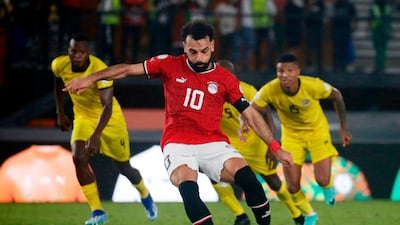You can measure Mohamed Salah’s tantalising, frustrating relationship with the Africa Cup of Nations in tiny details, many of them single, erratic bounces of the ball. Bad pitches have been an ongoing obstacle, the playing surfaces in two of his previous three expeditions to the tournament a blight although they were often also a stimulus that showed how resourceful Salah can be in adapting his slick, quick game when conditions impede it.
On Sunday the bounce of the ball, a ricochet off the inside of a goalpost and over the Mozambique goal-line from a Salah penalty, went hugely in his favour, and Egypt’s. With that injury-time equaliser for 2-2, an outcome as headline-making as any in Salah’s Afcon saga was averted.
Here’s some context for the shock 2-1 lead Mozambique held going into stoppage time at Abidjan’s Felix Houphouet-Boigny Stadium. The southern Africans have never won a match at an Afcon. In 12 games through four previous finals tournaments they had claimed a total of just two points.
Yet here they were, responding to a very early Egypt lead with two cleverly worked goals within three second-half minutes, the first a firm header, the second a smooth counter-attack. More context for the shock value of that turnaround: In Salah’s 18-game Afcon odyssey, he had only once previously been part of an Egypt team that conceded twice in a match. That was in the 2017 final, a 2-1 defeat to Cameroon and one of two finals where Salah has ended up with a silver medal.
The absence of an African title hurts the most celebrated African player of his generation. Salah has Premier League and Uefa Champions League titles, part of his full complement of prizes during his superb Liverpool career. But with Egypt, there have been only near-misses, the most excruciating the defeat to Senegal on penalties in the final two years ago.
It hurts Egypt, too, because Salah merits the best honour in African football. He has a blessed leader, emerging as a potential star just when the nation was building back after the tragedy of the Port Said stadium disaster in 2012, where rioting and a flawed security operation at a match between Al Masry and Al Ahly claimed 74 lives. Local club football went into a deep trough after that, and Egypt, three successive times the Afcon champions between 2006 and 2010, fell away as a national team.
Salah has been their pathfinder from that low ebb, but his obligation has been mostly to operate under cautious national coaches and bear a huge proportion of the creative responsibility. Salah for Egypt is a different entity to Salah for Liverpool.
At Afcons, he has too often had to accept that the ball will not run slick for him to accelerate on to, as it does on the well-manicured surfaces of English and European football’s upper echelons. When, after 15 minutes against Mozambique, with Egypt a goal up thanks to Mostafa Mohamed, Salah roamed into his Liverpool position, wide on the right, and, turning, his foot seemed to catch in the turf, with a sod of earth displaced, he would have been forgiven in feeling a familiar Afcon anxiety.
In Cameroon two years ago, and in Gabon in 2017, some of the playing surfaces were very poor. Egypt still reached the final at both events. When they had better pitches to play on, as hosts in 2019, they were ambushed in the last 16 round by South Africa, a huge let-down, made worse when rivals Algeria went on to win that tournament.
In Abidjan on Sunday, the grass was not actually the problem. Egypt’s openness, under a head coach Rui Vitoria who has less of the conservative instincts of predecessors like Carlos Quieroz and Hector Cuper, made them vulnerable. “We have to reduce the spaces and concentrate better,” acknowledged Rui Vitoria. “Mozambique gave us tactical problems, found gaps and took advantage.”
Mozambique had a clear plan, much of it centred on Salah, who took up central playmaker positions as often as he roamed to the flank. Wherever he was when Egypt were on the ball, Mozambique’s Reinildo usually had Salah on his immediate radar.
After the game The National asked Reinildo about the instructions given him, and the close policing of Salah. Reinildo smiled: “The coach knew what was going to work for us. I’m always there to help the team.”
Reinildo is tough, an expert man-marker. Players do not get signed by Atletico Madrid under the management of Diego Simeone, as Reinildo was two winters ago, if they are soft or indulgent. Reinildo is useful attacking left-back, too, but vigilance of Salah was a priority in Group B’s opening game.
Salah will be closely guarded by other markers as the tournament proceeds. And if it proceeds as its second day did, with Mozambique very nearly claiming a victory over Egypt – “I’m not sure if they should have had that penalty,” said Reinildo – Nigeria being held 1-1 by Equatorial Guinea and Cape Verde beating Ghana, there may be more nervous nights for a hungry Salah and his Pharaohs.


